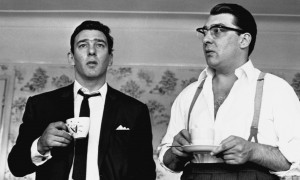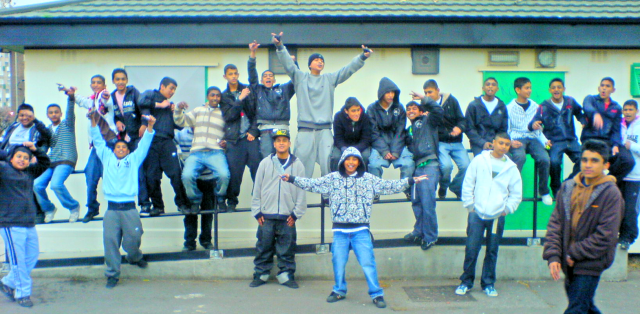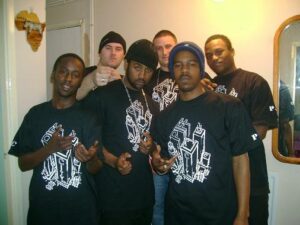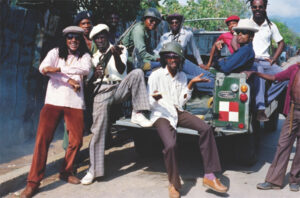There’s a lot of misunderstandings about gangs in the UK, both within the country and outside. Gangs over here are mostly small, short-lived kingdoms that fall as soon as they rise. And unlike other countries they very rarely have access to serious firepower. No-one’s cruising down the street popping off AK’s. And yet we have a tendency to view gang crime here in American terms (particularly in the tabloid press), as if the grimiest row of cottages in Castle Coomb has anything on the urban war zones of South Central Los Angeles or Prohibition-era Chicago. What we do have are some very nasty, small-scale local beefs which sometimes make the papers to build up this image of a ‘Broken Britain’, where grannies can’t walk home safely at night without being set upon by bands of feral, hoodie-wearing hoodlums.

1966, London, England, UK — The Kray twins at home after having been questioned by police about the murder of George Cornell. — Image by © Hulton-Deutsch Collection/CORBIS
There’s a stereotype, for example, that gangs are predominantly a ‘black’ thing, or somehow it’s the result of a black subculture. Not long after the 2011 riots, a well-known historian went on a popular news show and said that “the whites have become black”, claiming that black gangsta culture was responsible for the moral corruption and decay of society. You’d have thought that as a historian he’d have known about the Kray Twins; white, working-class mobsters who became two of the most notorious criminals of the 20th century. Ronnie and Reggie were born in the East End of London in 1933, and after a career as professional boxers built up an empire of robberies, nightclubs and extortion. It was the Swinging Sixties: we finally won the World Cup, and we unleashed the Beatles, the Rolling Stones and James Bond upon the world. It was cool to be a Brit. The Krays rolled with the times and became celebrities, appearing in magazines and rubbing shoulders with the rich and famous. Their main rivals were the South London based Richardson gang, who had a reputation for nailing people to the floor before going to work on them while their chief enforcer, “Mad” Frankie Fraser, pulled their teeth out with pliers. But the brothers weren’t exactly bastions of mental stability themselves: Ronnie was a paranoid schizophrenic. In the end both brothers got sent down for murder; Ronnie for shooting a rival gangster at the Blind Beggar pub, Reggie for stabbing drug dealer Jack “the Hat” McVitie. So this was apparently the good old days.
The 80s changed everything. Traditional organized crime families saw that the days of armed robbery and protection rackets were numbered. The hippies had the right idea: from now on it was all about drugs. So while they sat back and made a killing bringing in smack and blow, the hands-on work was left to a new generation. The rich-poor divide grew as Maggie Thatcher’s government scaled back the welfare state while single-parent families and other low-income groups were herded together on the estates. All this led to a lot of young people running around causing mischief.
Meanwhile, immigration was changing the face of London. Whereas a hundred years ago Britain owned half the world, now half the world was coming to us. Seems fair, but for some it didn’t feel that way. Black people, mainly from Africa and the Caribbean, suffered the most out of the growing poverty of the 80s, being confined to ghettos in Brixton, Peckham and Hackney. Marginalization like that is what breeds gangs. Patrick, an older gangster, told me how he originally got together with his boys because they were sick and tired of being called niggers. In London a lot of the poorer neighborhoods are black, but if you go to other cities like Liverpool and Glasgow you’ll be lucky if you spot someone with a tan. But street gangs in the UK are not based on what color you are but what hood you’re from, so you can always see a white boy rolling with a black crew (and vice versa).
One of the first things they ask you when you get to pen is if you have any gang affiliations. Everyone was represented there. You had the street gangs like GAS and One Chance/OC, both based in Brixton, the SUK (Stick-‘Em-Up-Kids) from Battersea, Peckham Boys, Piff City and Asian Virus. They all have beef with each other and bring that shit from the outside. Cos gangs in London define themselves by their hood that means that anyone who comes from a particular area is seen as affiliated, whether they like it or not, to their local gang. These street allegiances are what make the gangs up in prison, unlike America where racial shit defines whether you join the Aryan Brotherhood, Mexican Mafia, Black Guerrilla Family, Dirty White Boys, etc.
There were a few ethnic groups which did stick together like the Pikeys (Irish gypsies) and the Somalis, but they tended to be the exception rather than the rule. But even they split into street-based factions. One of the major gang beefs in London today is between the Wood Green and the Camden Somalis. In Isis one of the Somali camps, I forget which, seemed to be led by an angry dwarf with a serious Napoleon complex. There was a Somali kid who was in for robbing a petrol station after he lost his job. He was always polite to everyone, always said please and thank you, and had no gang affiliations. The Camden Somalis came up to him on his way back from mosque and asked him where he was from and, being oblivious to the ongoing beef, he innocently replied to them, “Wood Green”. They kicked the shit out of him right in front of the imam.
Every day, the talk on the yard amongst the prisoners would be who ruled in what ends, who was beefing with who and which crew moved the most product. There’s a blurry line between gangs and organized crime. To be sure, most of the dudes sitting in jail were in for some petty crimes, street robberies and that. But these guys are only at the very bottom end of the pyramid. Don’t forget that most mob bosses started out the same way, growing up on the street then learning and adapting. And someone has to do the dirty work. The Turks recognize this, subcontracting black street gangs to carry out hits. They also have their own squads, with most of the Turkish street gangs in North London being affiliated to one or another major heroin trafficking syndicate. That the Turkish street gangs have direct ties to the suppliers means they can skip the middleman, ensuring maximum profits for all.
Back in the 80s and 90s a big fuss was made about the Yardies, well-armed criminals coming in from Jamaica and supposedly setting off an explosion of gun crime. The Yardies were trigger happy for sure, taking their share of their crack market by shipping coke straight from the Caribbean, but the streets of Brixton never turned into the garrisons of Kingston. What the Yardies did do was cause a big scene bringing over their Jamaican slang, which is where our historian might have got confused. That didn’t lead little white boys to be led astray nor have they taken over, as by my time the Yardie era came and left while white English gangsterism remains alive and kicking. Old school white gangsters like the Adams family in Islington are important players on the scene and a lot of them have set up shop on the southern coast of Spain. It’s funny: the newspapers are always full of stories about foreign evildoers landing on our shores but Spain is the one country to which we export our criminals.
Me personally, I wasn’t down with that shit. Yeah I might have played around with the image a bit but I was basically one of those white, middle-class dealers that usually flies under the radar. My primary market was hipsters, yuppies and other students. Every month or so, I’d have a kilo or two sent down from my Hell’s Angels contact in the Midlands. Some of it I’d sell myself, some of it I’d pass on to some of my like-minded pals and pick up the profits later. Sometimes I passed them a few of my customers when I was busy. There’s far too much business for one guy, and drug dealing makes you work some seriously antisocial hours. If you wanna relax and enjoy your ill-gotten gains, you’ve got to have a distribution of labour else you run the risk of becoming some kind of drug dealing recluse everyone spreads rumors about. Since it was my food they were selling I was counting paper either way, or at the very least not making a loss, so it made sense to take a break every once in a while.
My neighborhood in the East End was, shall we say, ‘ethnic’, and had something of a history. Over a hundred years ago, Jack the Ripper practiced amateur surgery on some unlucky prostitutes only a few minutes down the road. Back in those days the local population mainly consisted of Russian and Polish Jews fleeing persecution in their homeland and the neighbourhood had a reputation for being a squalid shithole. Eventually the Jews made their money and moved out, leaving the area to working-class white citizens. By the 1970s it got taken over by Bangladeshis and now when you’re walking down the road it’s like playing a game of Spot the White Person. Me and my people saw no reason to tangle with the local crews, which originally formed in the 80s to protect the local community from racist attacks by the National Front, a far-right organization that was active at the time. You wouldn’t have thought it but Shoreditch, now entirely populated by hipsters, was once a proper white working-class area where the skinheads got together to launch attacks on Brick Lane. Since then it’s been gentrified to hell and taken over by hipster pussies and the racism threat is gone, so now the one-time vigilantes have taken to fighting amongst themselves: the Bethnal Green boys hate the Brick Lane boys who in turn hate the guys in Whitechapel and so on. And boy those fuckers are vicious. Unlike some of the other gangs the Bangladeshis don’t like to use guns; instead they prefer bats, swords and knives. They’re mainly brawlers rather than hustlers, but that’s not to say hustling doesn’t take place, it most definitely does. The elders give food to the youngers, which they shift over to both the hipster/student crowd and the local community. But we didn’t compete; I didn’t know them and they didn’t know me, and I liked to keep it that way. There was plenty of money to go round.
As I’m from London, I know best the sort of gangs that we have around here. But I’ve got friends in other towns like Manchester, Glasgow and Nottingham, and they’ve got interesting (and very different) stories as well.





